The Historian 166: Out now
The magazine of the Historical Association

Editorial: Crime and Punishment
Read The Historian 166: Crime and Punishment
Last summer, crime and punishment made the headlines as Britain’s prisons came close to full capacity. In response, the Justice Secretary, Shabana Mahmood, ordered the release of nearly 10,000 prisoners who had served a significant portion of their sentence. The aim was to free up space for more serious offenders. But for many commentators it seemed outrageous that so many prisoners could be released early. That outrage was compounded when, in May this year, the former Justice Secretary David Gauke published a sentencing report that called for changes to the law to make early release more common; the government plans to implement the findings as soon as possible. From the way some commentators are reacting it might seem like law and order is breaking down as prisoners run free.
Understanding the history of crime and punishment helps us to put the matter in perspective. Expectations of incarceration have changed significantly in recent years. The shock at early prison release does not account for the fact that we are living in an especially punitive era. Three decades ago, the prison population in the UK was less than half what it is today. And yet over the same period, crime rates have been significantly declining. According to the Office for National Statistics Crime Survey for England and Wales, by 2024 most categories of offences have fallen to one quarter of their 1994 level. The UK has one of the lowest crime rates in the world, with around one offence per 100,000 population.
Not that anybody might recognise these trends from exposure to popular culture. Crime is the best-selling fiction genre: there are surely more serial killers and child kidnappers on the shelves of any high street bookshop than in the cells of all Britain’s prisons put together. Crime dramas, documentaries, and podcasts slow the bandwidth on most streaming services. And enthusiasm for detection via social media has grown so significant that vigilante crime searches are interfering with high-profile police investigations.
We find crime history fascinating, but what is it that draws us in? As historians, we are often attracted to criminal archives because they give us access to people who might otherwise be hard to trace, especially in the medieval and early modern period when literacy rates were lower than in the modern era. As historians, we also find crime good to think with: interpreting changes in patterns of violence, rates of incarceration, or the language of the law can give major insight into the mentalities and conjunctures that define a period. But when we read and write about crime history, are we as distant from the popular fascination and political concern with crime as we might like to think?
This issue explores the history of crime and punishment from the Middle Ages to the present, and ranges widely across the British Isles, Europe, and the United States. The themed articles explore a recent project using coroners’ rolls to create murder maps of medieval cities, the role and attitudes of a prison chaplain in the sixteenth century, the life and afterlives of a Gypsy outlaw, the decline and fall of Britain’s prison hulks, the lives and crimes of Irish immigrant women in nineteenth- and early twentieth-century America, and the location of prison lockups in places where you might least expect them. Alongside these themed articles, we are delighted to feature prize-winning articles by young historians and a lively insight into medieval pilgrimage, news from the Conwy Borough branch, and an interview with Lyndal Roper about her new book on the German Peasants’ War of 1525 and why it matters today.
We hope the featured articles in particular offer rewarding reading for anyone involved in studying or teaching the popular GCSE module on Crime and Punishment in Britain, c.1000–present. But we hope there will be plenty here for anyone who has picked up a crime thriller to take on holiday, watched a gangster movie or murder mystery on a flight, or listened to a true crime podcast on the daily commute: we hope you might find the history both stranger and more interesting than fiction.

